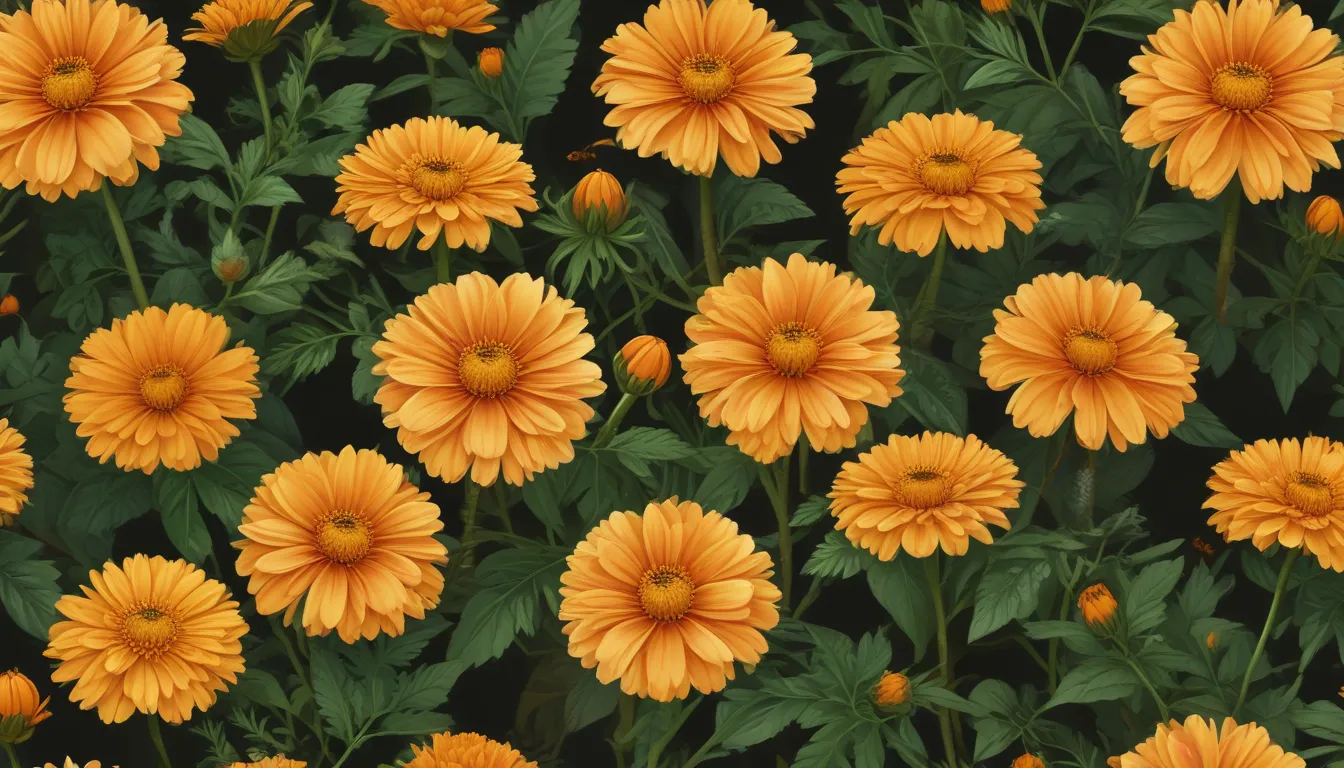The pictures in our articles might not always show exactly what the text is talking about. We use these images to make the article more interesting and eye-catching. They are there to add to the text, but not to replace it or show every detail.
Have you ever stopped to admire the vivid beauty of marigolds? These colorful flowers are a favorite among gardeners and flower enthusiasts worldwide. Not only do they brighten up gardens and landscapes, but they also hold a significant place in cultural and historical traditions.
In this article, we will delve into the world of marigolds and uncover 14 fascinating facts that will enhance your understanding and appreciation of these delightful blooms. From their diverse varieties to their uses in traditional medicine and skincare, marigolds offer a wealth of benefits. So, let's explore the enchanting realm of marigolds together!
The Marvelous World of Marigolds
Marigolds, belonging to the Tagetes genus, are flowering plants native to North and South America. Widely cultivated for their vibrant blooms and medicinal properties, marigolds come in various shapes, sizes, and colors. From French marigolds to African marigolds and signet marigolds, each variety boasts its unique characteristics and uses.
The Vibrant Colors of Marigolds
One of the standout features of marigolds is their bright and vibrant colors. With shades of yellow, orange, and red, marigolds add a burst of brightness to gardens, flower beds, and floral arrangements, making them a popular choice among gardeners and florists.
A Natural Pest Repellent
Marigolds are not just pretty flowers; they also serve as natural pest repellents. Their strong smell, described as pungent or musky, helps deter pests like aphids and nematodes, making them a sought-after choice for organic gardeners seeking a chemical-free solution.
From Garden to Plate
In some cultures, marigold flowers and leaves are used in culinary dishes to add flavor and color to salads, soups, and desserts. It's worth noting that while certain marigold varieties are edible, not all should be consumed, so it's essential to know which ones are safe for culinary use.
Medicinal Marvels of Marigolds
For centuries, marigolds have been a staple in traditional medicine due to their anti-inflammatory, antiseptic, and healing properties. Extracts and oils derived from marigold flowers find their way into skincare products for their soothing and moisturizing qualities.
Planting Partners: Marigolds as Companion Plants
Known for their ability to repel pests and attract beneficial insects, marigolds are often planted alongside vegetables and other plants to protect them from unwanted visitors. Their insect-repellent properties make them a valuable ally in the garden.
A Beacon of Good Luck
In folklore and traditions, marigolds are symbols of good luck and fortune. These cheerful blooms are often incorporated into rituals and decorations during festivals and special occasions, bringing a touch of positivity and prosperity.
Culturally Signficant Flowers
Across various cultures, marigolds hold deep cultural significance and are used in festivities, celebrations, and religious ceremonies. As symbols of joy, remembrance, and purification, marigolds play a vital role in cultural traditions worldwide.
Growing Guide for Marigolds
Luckily, marigolds are relatively easy to grow, making them a favorite among gardeners, especially beginners. These hardy plants thrive in well-drained soil, tolerate different temperatures, and require minimal maintenance, making them a low-effort, high-reward addition to any garden.
Insect-Repellent Marvels
Marigolds contain natural compounds like thiophenes and limonene that repel insects, making them a popular choice for natural insect repellents and bug sprays. Their pest-repellent properties make them a valuable asset in the fight against garden pests.
Frequently Asked Questions About Marigolds
- What are the different types of marigolds?
-
African marigolds, French marigolds, and signet marigolds are popular varieties, each with its unique characteristics.
-
Can marigolds repel pests?
-
Yes, marigolds are natural pest repellents and help deter insects like aphids, mosquitoes, and nematodes.
-
Are marigolds edible?
-
Certain varieties of marigolds are edible, but not all. Calendula officinalis, or pot marigold, is a popular choice for culinary use.
-
Do marigolds have medicinal properties?
-
Yes, marigolds are known for their healing properties and are used in traditional medicine for their anti-inflammatory and antiseptic qualities.
-
Are marigolds easy to grow?
- Yes, marigolds are relatively easy to grow and maintain, making them an excellent choice for beginner gardeners.
Embrace the Beauty of Marigolds
Marigolds are more than just beautiful flowers; they offer a myriad of benefits from repelling pests to adding color to culinary dishes and skincare products. With their rich history, diverse varieties, and cultural significance, marigolds continue to captivate and inspire gardeners, herbalists, and flower enthusiasts worldwide. So, why not add a touch of marigold magic to your garden and experience the wonders of these marvelous blooms firsthand?
Explore the World of Marigolds with Confidence
Our commitment to delivering accurate and engaging content ensures that you receive valuable insights and information on marigolds. We strive to provide trustworthy and compelling facts to enhance your knowledge and appreciation of these delightful flowers. So, trust in our dedication to quality and authenticity as you embark on a journey of discovery and wonder with marigolds by your side.






